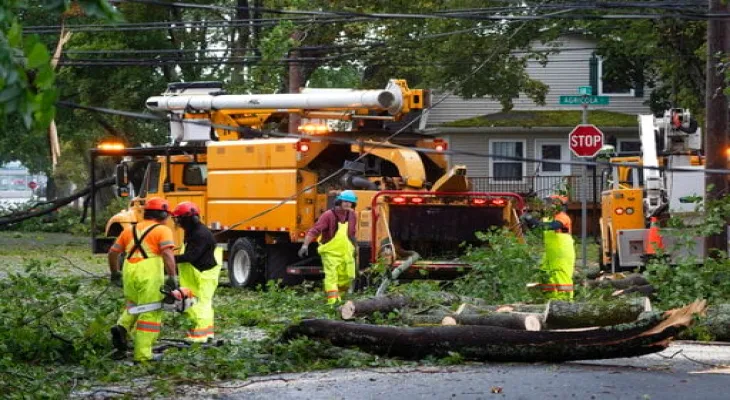Search here
Newspaper
Search here

Arab Canada News
News

Published: September 27, 2022
Prime Minister Justin Trudeau is touring the areas severely affected by post-tropical storm Fiona on Tuesday to assess the damage and see how federal resources are helping on the ground in Atlantic Canada.
The situation remains dire in some parts of Newfoundland and Labrador, Nova Scotia, and Prince Edward Island, where thousands of residents are still without power and roads have become impassable due to storm debris.
At a press conference in Ottawa, Defence Minister Anita Anand said more Canadian Armed Forces (CAF) personnel have been deployed to assist with cleanup and support hydro workers as they restore power to large parts of the region still in the dark days after the storm swept through.
There are now about six units working in the three provinces hardest hit by Fiona – about 450 military personnel. Anand said this is up from about 300 CAF personnel who were in the area yesterday.
Responding to a question about whether Ottawa will send more, Anand said she is ready to deploy additional soldiers if the provinces request support and if there is work for the Canadian Armed Forces to do. She said, "We need to be able to adjust our strategy if necessary." "As missions come to the Canadian Armed Forces, clearly we will deploy them for these tasks. It's not that we don't have troops ready to deploy.
Anand said the CAF is conducting "wellness checks" in Port aux Basques, a coastal Newfoundland town partially leveled by Fiona. The minister said military personnel – some of whom recently arrived aboard the naval patrol ship HMCS Margaret Brooke – will help move people away from damaged and vulnerable homes. Economic Development Rural Minister Judy Hatcher, who represents this area of the province in the House of Commons, said the stories coming out of Port aux Basques are "heartbreaking and painful."
She said the damage is "stunning" but pledged to Newfoundlanders to "build back better" once the situation stabilizes. In Cape Breton, where thousands of trees across the island were uprooted, soldiers are helping clear debris to make it easier for Nova Scotia Power crews to repair disrupted hydro lines.
In P.E.I., where 60,000 homes remain without power, soldiers are also working alongside Maritime Electric workers to help bring hydro back online. The massive number of fallen trees on P.E.I. has made it difficult to carry out this work. CAF members are assisting the provincial Department of Transportation and Infrastructure in cleanup efforts.
Anand said forces will remain on the ground "as long as we are needed" and that recovery from the storm "is a top priority for us locally." Minister of International Government Affairs Dominic LeBlanc said he is in contact with premiers in the region about possible financial support for areas affected by the storm. While this is largely a provincial responsibility, LeBlanc said there could be a role for the federal government to play in supporting individuals and businesses bearing the brunt of the severe storm.
LeBlanc said talks are underway about the government taking a more active role in providing insurance for communities that may become increasingly uninsurable as climate change causes havoc.
While the United States has a national flood insurance program to help cover some of the costs of providing coverage, property and casualty insurance markets in Canada are almost entirely private.
This means some insurers here may hesitate to expand coverage to increasingly flood-prone or otherwise natural disaster-prone areas like wildfire zones – or premiums may become prohibitively expensive for many people.
LeBlanc said, "This is a direct function of extreme weather events that, unfortunately, will not diminish over the coming months."
"The status quo that may have existed over the past 20 years does not seem to be the right position for the number of years ahead."
Edited by: Yusra Bamtaraf
Comments